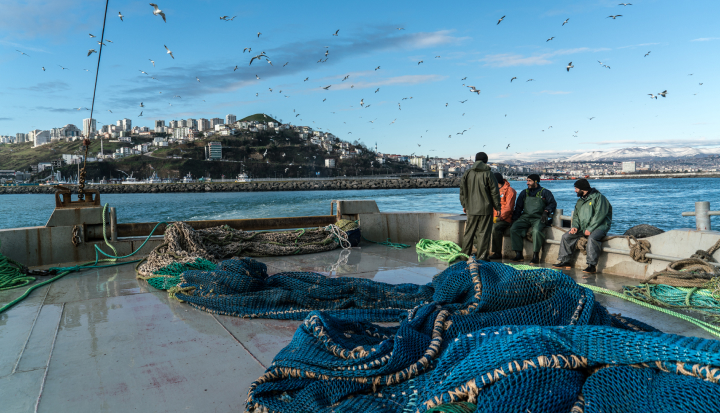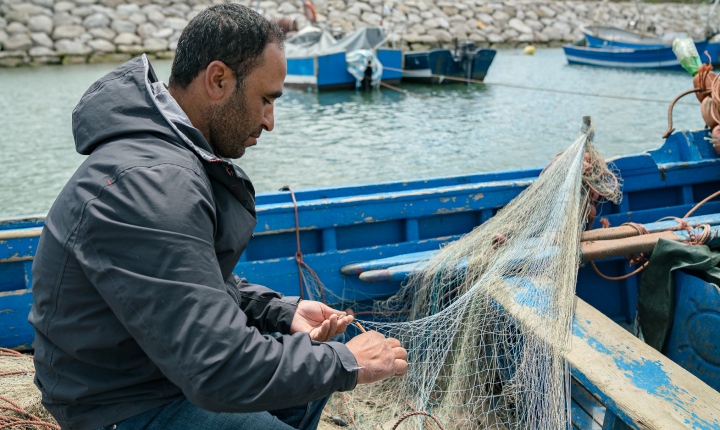From policy to action: major advances in the fight against IUU fishing
Countries in the Mediterranean and the Black Sea are taking action to level the playing field for legitimate fishers in the region and ensure that seafood is obtained through regulated activities.

The International Day for the Fight Against Illegal, Unreported and Unregulated Fishing is not merely a note on the calendar. It is a global call to protect our oceans and the communities who depend on them.
In the Mediterranean and the Black Sea, the tide is turning on illegal, unreported and unregulated (IUU) fishing. Over the past year, the General Fisheries Commission for the Mediterranean (GFCM) has significantly stepped up its cooperation with countries against IUU fishing, translating commitments into concrete action – at sea, at port and in policy. Ahead of the 2025 United Nations Ocean Conference taking place next week in Nice, the message is clear: IUU fishing has no place in the region’s future.
A united front against IUU fishing
Championed by the European Union and its Member States, alongside Türkiye, Morocco and other countries, the GFCM is making significant strides in the fight against IUU fishing. A key advance in this campaign is the recently amended European Union Control Regulation, which, at the end of 2023, contributed to significantly strengthening the use of digital technologies and modern data management systems to monitor fishing activities among European Union countries. This includes promoting the use of intuitive mobile applications to streamline reporting procedures for both professional and recreational fishers and for all fishing vessels, regardless of their size, making it easier to record their catches in electronic logbooks or other online platforms. The GFCM is leveraging the experience of its Members in order to apply lessons learnt across the region and is stepping up to effectively curb IUU fishing.
“Over the years, the fishing sector’s responsibilities on resource conservation and inspections have increased. Following through has been made possible thanks to the implementation of advanced technologies for real-time control and monitoring. This translates into a sustainable future for our fishery resources”, says a fisheries inspector at the Maritime Fisheries Service in Malaga, Spain.
A cornerstone of these efforts lies in the development and implementation of national plans of action to prevent, deter and eliminate IUU fishing (NPOA-IUU). So far, 2025 has recorded important improvements in this area, with Albania, Montenegro, Türkiye and Ukraine all working closely with the GFCM to draft, revise and operationalize their national frameworks.

Fishers in Türkiye ©FAO-GFCM/Claudia Amico
“The role of fisheries inspectors has evolved significantly, with technology and tighter regulations enhancing our capacity to detect and deter IUU fishing. These changes not only support fairer fisheries governance but also strengthen the protection of fragile marine ecosystems. Our work today is more than enforcement – it’s a commitment to sustainability,” says Sadettin Doğu, a Turkish fisheries inspector.
These plans are backed by a regional toolbox — legal templates, best practices and hands-on support — designed to aid countries in the development of their NPOA-IUU. They also align with international best practices, the GFCM 2030 Strategy, and the GFCM Regional Plan of Action to Combat IUU Fishing.
New technologies enhance traceability
Morocco is among the first countries to have developed electronic solutions for reporting catches and tracking small-scale fisheries, using technologies such as radio frequency identification to enhance product traceability and combat IUU fishing.
"We fish day and night, but illegal fishing threatens our future; it depletes the fish stocks we depend on. If the sea is empty, there’s no livelihood for my family," says El Ayachi El Gargari, an artisanal fisher from Morocco.

Fisher in Morocco ©FAO-GFCM/Claudia Amico
The GFCM has supported this process by adopting binding recommendations and offering dedicated legal reviews and legislative drafting support to several countries.
Relevant GFCM decisions
- Recommendation GFCM/46/2023/19 on the establishment of a catch documentation scheme for red coral in the Mediterranean Sea
- Recommendation GFCM/46/2023/20 on the establishment of a catch documentation scheme for turbot in the Black Sea (geographical subarea 29)
- Recommendation GFCM/46/2023/21 on vessel sightings, amending Recommendation GFCM/44/2021/21
- Recommendation GFCM/46/2023/17 on an international joint inspection and surveillance scheme for common dolphinfish fisheries outside waters under national jurisdiction in the Mediterranean Sea
- Recommendation GFCM/46/2023/18 on an international joint inspection and surveillance scheme outside waters under national jurisdiction in the Adriatic Sea (geographical subareas 17 and 18)
These actions are complemented by trainings to equip national authorities and inspectors with the skills and tools needed to strengthen fisheries controls. Across the region, joint inspection procedures are being tested, and new technologies are being rolled out into vessel monitoring systems (VMS), creating a more modern, unified and transparent enforcement system.
A novel device to assist inspectors and protect fishers
Montenegro recently participated in a pilot VMS programme that tested transponders on voluntary small-scale fishing vessels. This initiative marked a turning point in the cooperation between fishers and authorities, demonstrating the feasibility of integrating small-scale fisheries into digital monitoring frameworks.

Srećko Andričić, fisher from the Municipality of Tivat, Montenegro
"Vessel monitoring system devices are key to protecting marine resources by showing where vessels operate. They help detect illegal fishing and support better planning and conservation efforts."

Knežević Ivo, fisher from Ada Bojana, Ulcinj, Montenegro
"I welcomed the VMS pilot on my vessel for its many benefits. It boosts safety on our small boats and helps inspectors detect illegal fishing. The data also supports resource conservation and ensures fair use of state support like fuel aid."
Looking Ahead
In 2015, the GFCM proposed 5 June as the International Day for the Fight Against IUU Fishing — a date marking the entry into force of the historic Port State Measures Agreement. Ten years on, the fight against IUU fishing is far from over, but something fundamental is changing. Countries are no longer working in isolation. They are sharing knowledge, coordinating actions and shifting from policy commitments to concrete actions.
As we celebrate IUU Day 2025, we honour the collective efforts of governments, fishers, inspectors and coastal communities fighting for more just and sustainable oceans. The GFCM remains a committed partner in this effort, helping turn ambition into action and action into lasting impact.
Looking ahead, the fight against IUU fishing is about protecting people, ecosystems and the future of our seas.
The GFCM’s work on compliance is made possible thanks to the financial support of the European Union, main donor of the GFCM, as well as the support provided by the Global Environmental Facility.
Resources:
- International Day on the fight against IUU fishing | FAO
- Declaring an International Day for the Fight against IUU Fishing | GFCM, 2016
- Regional Plan of Action to Combat IUU Fishing | FAO
Join the conversation on X at #FightIUUFishing
Cover photo: Inspections at the port © Ministry of Agriculture and Rural Development, Albania
Major advances to #FightIUUFishing in the Mediterranean and the Black Sea
— General Fisheries Commission for the Mediterranean (@UN_FAO_GFCM) June 5, 2025
Countries are taking action to level the playing field for legitimate fishers in the region & ensure that seafood is obtained through regulated activities.
🔗https://5023w.roads-uae.com/pmuvT1uGIQ#GFCMCompliance pic.twitter.com/L6KGg05SdT
